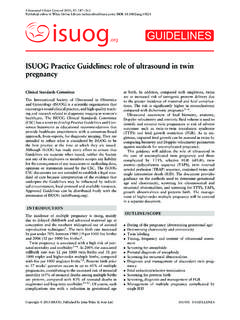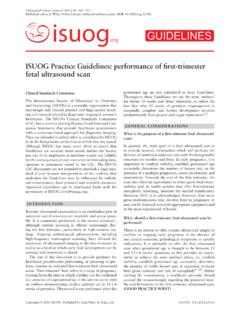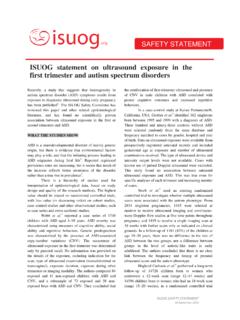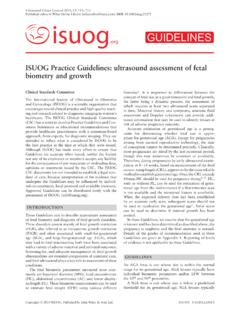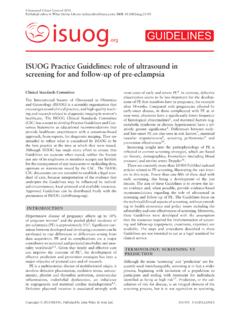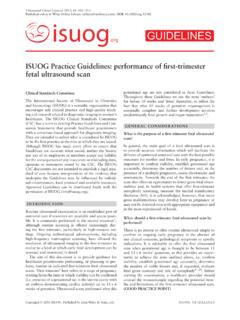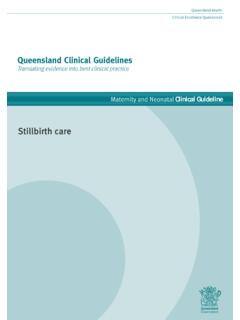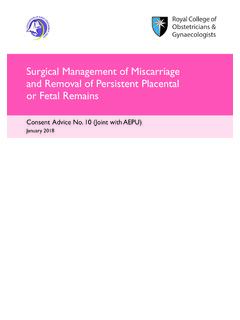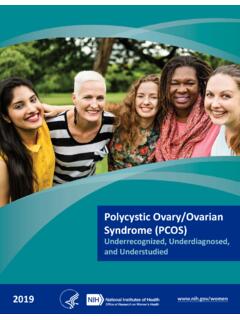Transcription of Assessing normal and abnormal pregnancy from 4-10 weeks
1 ISUOG s basic training curriculum Assessing normal and abnormal pregnancy from 4-10 weeks Monique Haak ISUOG s basic training curriculum Goals 4-10 week assessment by US normal appearance gestational sac (GS), yolk sac (YS) and embryo Assessment of mean sac diameter (MSD) and CRL Viability criteria and terminology in non-viable pregnancy Recognition of ectopics, principles of pregnancy of unknown location (PUL) Role hCG and management of PUL Molar pregnancy ISUOG s basic training curriculum Conception and implantation ISUOG s basic training curriculum Embryo from 0-8 weeks Source: The Virtual Human Embryo Project ISUOG s basic training curriculum Implantation-> gestational sac NEJM 2001;345/1400 1st evidence pregnancy on ultrasound ; completely embedded blastocyst 14 d post conception ISUOG s basic training curriculum Gestational sac Small, round fluid collection inside uterine cavity Normally positioned in mid-to upper uterine cavity Surrounded by a hyperechogenic rim Visible at approximately 4 weeks gestation Beware of difference in gestational age and embryo age ISUOG s basic training curriculum Location of gestational sac within upper half of uterus ISUOG s basic training curriculum 40 weeks - 2 mm ISUOG s basic training curriculum ?
2 ISUOG s basic training curriculum Gestational sac measurement Mean of 3 orthogonal planes Growth in early pregnancy 1mm/day Knez et al Best practice Reseach Clin O 28:621-36 64w mean 54w mean Gestational sac diameter weeks ISUOG s basic training curriculum Yolk sac First structure identified within gestational sac Confirms intra uterine pregnancy , 100% PPV Spherical in shape Echogenic periphery Sonolucent center Attaches to embryo by vitelline duct ISUOG s basic training curriculum Yolk sac Imaged ~ 5 - w Imaged when MSD ~ 5-6 mm Imaged 3-5 d prior to embryo Diameter peaks at 6 mm at 10 w, then decreases Usually not visible after first trimester Number of yolk sacs usually equals number of amnions ISUOG s basic training curriculum Yolk sac 50 and 74 weeks ISUOG s basic training curriculum Yolk sac in multiple pregnancy Dichorionic diamniotic Monochorionic diamniotic Monochorionic monoamniotic ISUOG s basic training curriculum Amnion First seen ~ w small membraneous structure continuous with the embryo Contains clear fluid Separates the embryo and amniotic space from the extraembryonic coelom Obliterates the coelomic cavity by 12-16 weeks 93w Amnion 92 w 73 w Amnion ISUOG s basic training curriculum Heartbeat use M-mode weeks 55 w Heartbeat visible form CRL > 2-4 mm Rapid frequency 5-9 weeks Use M-mode 74 w ISUOG s basic training curriculum Crown Rump Length (CRL)
3 ISUOG guideline Midline sagittal section of whole fetus Ideal orientation horizontally Magnification fill most of width of screen Fetus in neutral position Amniotic fluid between chin and chest Endpoints clearly defined ISUOG guideline 1st trim us scan UOG 2013;41:102-113 ISUOG s basic training curriculum Embryo 6-8 weeks 64w 74w 74w 84w ISUOG s basic training curriculum 94 weeks ISUOG s basic training curriculum 10 weeks ISUOG s basic training curriculum Practical rules early pregnancy Transvaginal ultrasound Abdominal ultrasound Gestational age Measurement Gestational age Measurement GS 40 2 mm 50 10 mm YS 50 2 mm 60 3 mm Heartbeat 54 70 bpm 64 110 bpm CRL 53 3 mm 63 6 mm Movement 70 70 CRL in cm + 6,5 = GA in weeks ISUOG s basic training curriculum Pain & blood loss in early pregnancy Event Frequency Pain & vaginal bleeding 1:5 pregnant women Blood loss 50% continue into normal pregnancy 50 % remaining blood loss Non viable, of which 10 15% ectopic pregnancy Obstetric cause: miscarriage , ectopic, haemorrhage ruptured corpus luteum cyst, ovarian torsion Non-obstetric cause.
4 Cystitis, appendicitis, ureteric stones, constipation Knez et al Best Practice Res Clin O 28:621-636 Pain in early pregnancy late symptom!! ISUOG s basic training curriculum Terminology early pregnancy events 1 Terminology Comment Viable Results in liveborn baby Nonviable Cannot result in liveborn baby (failed intrauterine pregnancy , ectopic pregnancy ) Intrauterine pregnancy uncertain viability TV ultrasound - intrauterine GS, no heartbeat Empty sac GS: absent structures, minimal debris, no heartbeat Human chorionic gonadotropin Positive serum pregnancy test serum hCG > 5 IU/mL Doubilet et al NEJM 2013;369:1443-51 ISUOG s basic training curriculum Terminolgy early pregnancy events 2 Terminology ultrasound findings Fetal loss Previous CRL and heartbeat followed by loss of heartbeat Delayed miscarriage / early pregnancy loss US intrauterine pregnancy : reproducible loss heart activity, failure increase CRL over 1 w or persisting empty sac at < 12 w Ectopic pregnancy + blood/urine hCG, gestational sac outside uterus Heterotopic pregnancy Intrauterine + ectopic pregnancy pregnancy of unknown location (PUL) No identifiable pregnancy on US with + blood/urine hCG Farquharson et al Human Reproduction 2005.
5 20:3008-3011 ISUOG s basic training curriculum Guideline TV US intrauterine pregnancy failure and uncertain viability Diagnostic for pregnancy failure Suspicious / not diagnostic pregnancy failure CRL 7 mm no heartbeat CRL < 7mm no heartbeat Mean GS 25 mm no embryo Mean GS 16-24 mm no embryo Absence embryo with heartbeat 2 wk after scan GS without YS Absence embryo with heartbeat 7-13days after scan GS without YS Absence embryo with heartbeat 11 days after scan GS with YS Absence embryo with heartbeat 7-10 days after scan GS with YS Absence embryo 6 wks after LMP Empty amnion adjacent to YS no embryo Enlarged YS > 7mm Small GS in relation to size of embryo (< 5 mm difference between mean GS and CRL Doubilet et al NEJM 2013;369:1443-51 If viability in doubt rescan after 1 week ISUOG s basic training curriculum early pregnancy : Vitality normal abnormal Uncertain viability 62 weeks GS and YS, no heartbeat Repeat scan 1 week ISUOG s basic training curriculum Gestational sac: failing pregnancy ISUOG s basic training curriculum Twin pregnancy with vanishing twin 11w 7w 24 mm Evron et al Fertil Steril 2015.)
6 103:1209-14 ISUOG s basic training curriculum Haematoma ISUOG s basic training curriculum miscarriage 8 weeks no heartbeat ISUOG s basic training curriculum Ectopic pregnancy hCG (intact + -subunits) 0 50000 100000 150000 200000 250000 3 4 5 6 7 8 9 10 12 14 16 18 weeks IE/L P95 median P5 early pregnancy : normal values of hCG ISUOG s basic training curriculum early pregnancy : normal values of hCG hCG (intact + -subunits) 0 500 1000 1500 2000 2500 3000 3 4 5 6 weeks IE/L P95 median P5 hCG (intact + -subunits)050000100000150000200000250000 34567891012141618weeksIE/LP95medianP5 Gestational sac visible at 1800 MIU/ml ISUOG s basic training curriculum Ectopic right fallopian tube LMP 8 weeks ISUOG s basic training curriculum Interstitial pregnancy ISUOG s basic training curriculum Ectopic management Day 1 51w Abdominal pain minimal bloodloss Empty uterus L and R ovary normal hCG 1349 IU/L Return in 2 days Day 3 53w Empty uterus Next to L ovary ectopic mass x cm hCG 1890IU/L ISUOG s basic training curriculum Cervical ectopic pregnancy Gestational sac in lower segment in cervical canal ISUOG s basic training curriculum Gestational sac in lower segment - in cs scar ISUOG s basic training curriculum Heterotopic pregnancy Intrauterine Ectopic Prevalence heterotopic pregnancy Spontaneous pregnancy 1:30,000 ART pregnancy 1:100-500 Maruotti & Russo Fert Ster 2010.
7 94:e49 ISUOG s basic training curriculum Management Protocol pregnancy Unknown Location (PUL) Progesterone (nmol/L) -hCG (IU/L) Likely diagnosis Management < 20 >25 Spontaneous resolving pregnancy Check urine or serum -hCG in 7 days 20-60 >25 Unviable or ectopic pregnancy with moderate risk requiring intervention Check serum -hCG in 2 days >60 <1500 normal intrauterine pregnancy Repeat scan when -hCG expected > 1000 >60 >1500 Ectopic pregnancy with high risk requiring intervention Repeat scan same day by senior examiner Day et al UOG 2009;33:704-710 ISUOG s basic training curriculum Hydatiforme mole ISUOG s basic training curriculum Hydatiforme mole Complete Partial Prevalence 1:1500-2000 Prevalence 1:700 46, XX only paternal 69 XXX of 69 XXY (triplo dy), paternal and maternal Persisting throphoblast 15% 2% 84w 15 w HCG ISUOG s basic training curriculum Hydatiforme mole in twin pregnancy Blood loss and abdominal pain 8 weeks US dichorionic twin pregnancy of which 1 mola hCG IU/l Counseling: miscarriage , hypertension, preeclampsia, thyroid disease, persistent trophoblast disease, lung metastases Prevalence 1 ISUOG s basic training curriculum Accuracy of US diagnosis Kirk et al UOG2007.
8 29:70-75 Histology: CHM PHM Accuracy US 95% 20% Histology: non molar failed pregnancy ISUOG s basic training curriculum Conclusion Aware of normal appearance and assessment GS, YS & embryo from 4 weeks gestational age onwards Criteria and terminology of viable and nonviable pregnancy In doubt about viable intrauterine pregnancy : repeat scan 1 w Scan uterus and ovaries to recognize ectopics Management of PUL and role hCG and progesteron Molar pregnancy appearance and pitfalls In doubt of location of pregnancy : repeat scan within 2 days ISUOG s basic training curriculum Complete MOLA Partiele MOLA Karyotype: 46, XX (85%) or 46 XY (15%): all chromosomes are paternal. Mechanism: Androgenesis: 23, X sperm fertilizes an egg that is maternal inactivated, meaning that the egg has no active maternal chromosomes or an empty egg ( no maternal chromosomes). The egg upon fertilization, duplicates the paternal chromosomes leading to 46, XX (A).
9 In regards to 46, XY moles, the maternal inactive egg is fertilization by two sperm with one carrying the X and the other carrying the Y gene (B). Hydropische zwelling van alle vlokken; geen embryonale structuren. 1:2000 zwangerschappen Persisteren 15% Karyotype 69, XXX or 69, XXY: Two sperm either 23, X or 23, Y fertilized the ovum leading to triploidy (C) (chomosomen zijn zowel paternaal als maternaal). hydropische zwelling van een gedeelte van de vlokken; embryonale structuren kunnen aanwezig zijn. 1: 20 000 zwangerschappen Persisteren 2%
